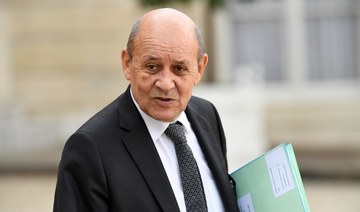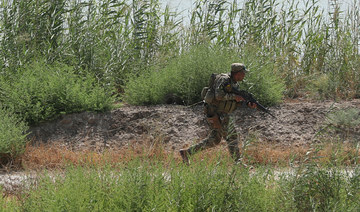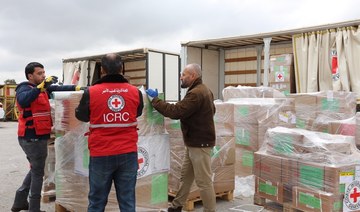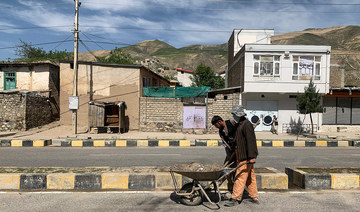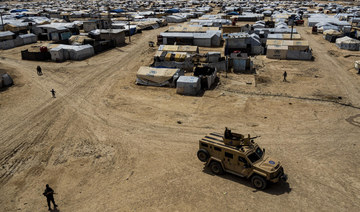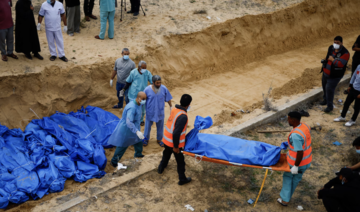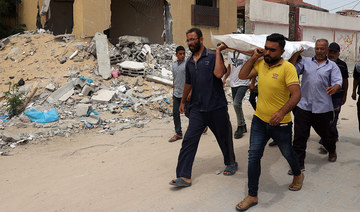LONDON: As many as 750 boys, some as young as nine, are being held in prisons for people linked to Daesh in northeast Syria.
None of the boys, including at least one UK national and several other Westerners, have ever been charged with a crime.
In some cases, they have been held in the prisons, funded partly by the UK, for over three years, without education, family visits, proper food, or even natural sunlight.
The prisons are run by the Kurdish-led Syrian Democratic Forces, which captured the boys along with 10,000 Daesh members and their families. The SDF has refused NGO requests to evacuate wounded and ill boys from its facilities on security grounds.
Earlier this month, an Australian teenager, Yusuf Dahab, died from wounds sustained during a Daesh raid in January on a prison in the Ghwayran neighborhood of Hassakeh, 40 miles from the Turkish border, while others were believed to have died during or soon after the incident.
Tuberculosis is rife, and many boys struggle with serious injuries, some sustained in the January raid and there is limited access to medical treatment.
In February, UNICEF’s representative in Syria, Bo Viktor Nylund, told the New York Times after a tour of the area that the boys in the prisons lacked food and medicine.
But the most pressing concern is that the whereabouts and conditions of some boys, dubbed “Cubs of the Caliphate” by their captors, are unknown.
Fionnuala Ni Aolain, the UN special rapporteur on counterterrorism and human rights, told the Daily Telegraph: “There are at least 100 children missing. Either children who were killed during the attack or moved out of the prison to locations where they have not been identified. Under international law, we would call that enforced disappearance.
“I believe there are a number of children with serious and potentially life-threatening injuries who remain in that prison, and I believe that some of those children are ... from Western states,” she added.
The SDF told the New York Times in February that 121 of its personnel were killed in the January raid but did not give details about the number of casualties among inmates.
Most of the boys are from Iraq and Syria. But at least 150 are foreign nationals — which poses a legal headache for the SDF and the governments of those foreign nationals, most of whom have no wish to repatriate them — leading to countries like the UK paying to maintain the prison system in northern Syria.
US Lt. Gen. Paul Calvert, a senior commander in the coalition against Daesh, suggested last year that the UK alone gave around $20 million to the SDF for the prison system.
Experts have warned that funding the SDF’s prison system likely violates international law. UN officials wrote to the UK government in February, saying its actions facilitated “mass arbitrary detention,” which was “incompatible” with the International Covenant on Political and Civil Rights.
The UK responded that it was “particularly concerned about the condition of minors — including reports of possible casualties or injuries resulting from the recent attack on Ghwayran, a lack of access to healthcare, the prevalence of TB and possible malnutrition.”
But it denied that funding the prisons entailed legal liability. “We are planning to scale up humanitarian assistance for minors in detention in 2022,” it added.
Letta Tayler, associate director and counterterrorism lead at Human Rights Watch, told the Telegraph: “The silence on the numbers raises yet more questions as to why dozens of governments are allowing an under-financed, embattled, non-state actor to manage a population of tens of thousands foreign (Daesh) suspects and family members, none of whom have ever been before a court, much less charged with a crime.
“The UK’s funding of facilities holding detainees indefinitely in life-threatening conditions with no due process whatsoever raises serious legal questions,” she added.
The death of Dahab gained prominence after voice notes left by the teenager asking for help were revealed by his family in Australia in the aftermath of the raid.
“I got injured in my head and my hand,” he said. “I lost a lot of blood. There’s no doctors here, there’s no one who can help me.”
He added that 15 to 20 children had been killed in the raid, saying: “I’m very scared. I need help.”
Dahab’s family announced his death on July 18. Since then, neither the SDF nor the Australian government has confirmed his death.
“The Department of Foreign Affairs and Trade is seeking to confirm reports an Australian male has died in Syria,” an Australian government spokesperson told the Telegraph.
Tayler said: “Yusuf could be one of many boys who have met or are about to meet this same fate. How many more lives will it take before governments take responsibility for their nationals held unlawfully in life-threatening conditions in northeast Syria, the majority of them children?”




